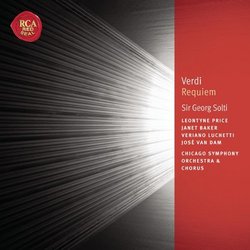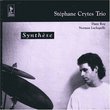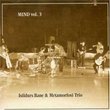| All Artists: Giuseppe Verdi, Georg Solti, Janet Baker, Chicago Symphony Orchestra, Leontyne Price, Veriano Luchetti Title: Verdi: Requiem Members Wishing: 0 Total Copies: 0 Label: RCA Release Date: 10/12/2004 Album Type: Original recording remastered Genre: Classical Styles: Opera & Classical Vocal, Historical Periods, Early Music, Modern, 20th, & 21st Century, Symphonies Number of Discs: 2 SwapaCD Credits: 2 UPC: 828766231823 |
Search - Giuseppe Verdi, Georg Solti, Janet Baker :: Verdi: Requiem
CD DetailsSimilar CDs
|
CD ReviewsMovin' the Heavens..and heart: Verdi's Requiem w/Solti&Price Donizetti's Kid | NYC, NY United States | 05/31/2006 (4 out of 5 stars) "This recording of Verdi's "Messa di Requiem" is one of the most thrillingly-conducted performances available. Maestro Sir Georg Solti's second recorded "Requiem" has a distinct advantage over his first one (a lovely performance with Dame Joan Sutherland & Luciano Pavarotti). This recording showcases the justly-renowned Chicago Symphony Orchestra, and the outstanding Margaret Hillis-led CSO Chorus. They are not bettered by anyone. The sonorities are astonishing, and this choral work, replete with orchestra and vocal soloists, is chock-full of musical felicities.[The re-mastering of this set only enhances the incredible warmth and beauty that is supplied by chorus and orchestra. The soloists' contributions are given more breadth and clarity, with both the soprano and mezzo benefitting especially.] Solti's quartet of soloists are stellar artists,led by pre-eminent Verdi soprano Leontyne Price, but curiously, they don't operate on quite the same level as Chorus and orchestra. The great American soprano Leontyne Price has enjoyed a long and fruitful association with the'Requiem', having recorded it twice commercially,(notably with Fritz Reiner & Jussi Bjoreling in the early '60s), twice at the MET on live broadcasts, a legendary La Scala perf. with Herbert Von Karajan & a young Pavarotti (now available on DVD),and many extant recordings from as early as 1957. Here, her voice is now darker, fuller, if less vibrant, producing greater power in the fortes, and supplying creamy, soft tones, spun with incomparable beauty and ease in the upper reaches. That ease is much less evident in her lower voice, where the sound is often breathy or chested,and with more than a hint of rasp. Overall, Ms.Price's contributions are still quite wonderful (her entrance in the "Kyrie"; the long-breathed "sed" in the Offertorium; "Agnus Dei"; & a very dramatic "Libera Me")if eclipsed by her earlier sublime (and lyric) performance with Maestro Fritz Reiner. Renowned English mezzo-soprano Dame Janet Baker, one of the greatest recitalists ever, brings a searing intensity, vocal warmth, and her manifest communicative skills to this performance. She sings fluently & reminds us that we are truly hearing a Mass. Dame Janet's voice is not particularly powerful,and she's somewhat over-matched in the louder sections of this work. No matter as she's magical in the softer ones, and always deeply affecting. The gifted Swiss Bass-baritone Jose Van Dam sings superlatively throughout and,though lacking only in the 'profundo' aspects of the music, his combination of vocal beauty, potent musicality, and requisite power -prodigiously displayed here- proves irresistible. Mr. Van Dam is simply one of the finest to have recorded this music. Italian tenor Veriano Luchetti is perhaps the "weakest link" here. This voice notably lacks the tonal beauty of his fellow colleagues! To be sure, he produces it well, modulates it with care, and sings sensitively throughout. Too,his voice is of sufficient size for the heaviest demands that Verdi's music requires of the tenor soloist in this work. Unfortunately, Mr. Luchetti's voice is also extremely nasal in quality, metallic-sounding and slightly pinched in the upper register. Lamentably, he is unable to produce a trill("In Gemisco" and "Hostias")or supply any of the honeyed tones one expects to hear in either piece.(He can be heard to slightly-better advantage in his second "Requiem" with Maestro Zubin Mehta & Montserrat Caballe). Nonetheless, this 'quartet' blends warmly in their concerted numbers, while the choral music is magnificently sung whether in the"Dies Irae","Sanctus","Agnus Dei" or "Libera Me". However, the greatest praise must be given to Maestro Sir Georg Solti, whose genius in this score is unsurpassed by any of his rivals. Solti infuses the music with an almost unbearable undercurrent of tension not absent in even the quietest moments of the work. Verdi's thundering "Dies Irae" in Solti's hands(abetted by the excellent CSO) invokes genuine terror, and the solo interludes do little to abate it. The hushed supplication of "Lux aeterna" is shattered by Ms.Price's taut, urgent reading of "Libera Me", the final hellish return of the "Dies Irae", a somber "Requiem aeternum", and crowned by Sir Georg's blazing rendition of the fugue that ends this sublime work. This newly re-mastered recording of the Verdi Manzoni Requiem" -especially at mid-price- is the bargain-hunters' DREAM. Whether you're new to this music, or a seasoned "Requiem" lover like myself -I own at least (20) twenty performances - this one should be in your collection!" Turning the Verdi Requiem into a crude, blatant spectacle Santa Fe Listener | Santa Fe, NM USA | 07/09/2006 (3 out of 5 stars) "Solti made two versions of the Verdi Requiem, this being the second, that operate on the same basis: maximize the thrills, play most of the movements loud and fast, and eradicate any sense that Verdi's intention was religious. Clearly many listeners and critics approve. Along with Muti, another member of this school, Solti's Requiem recordings have garnered much praise but also much criticism. It's a cliche to call this Mass a Verdi opera in disguise, but shouldn't there be some reverence?
If you don't think so, then hearing the music take a pummeling won't bother you. Although the CSO Chrous is beyond reproach, I think it's generally conceded that Solti's first version on Decca with Pavarotti, Sutherland, Horne, and Talvela, all in their prime, is a more exciting ride. Leontyne Price owned the soprano part, as can be heard to thrilling effect in her earlier accounts with Karajan (on DVD) and Reiner. Here her upper range remains superlative, but everything lower down is belted out, with a leathery bottom half octave that's turned coarse and leathery. Luchetti bawls his part with distressing vulgarity, while Baker and van Dam, excellent as they are, push too hard to sound larger than life. I am giving this recording three stars for its best parts. In actuality, I'd never listen to this account of the Requiem, given its coarseness and lack of spirituality." |






